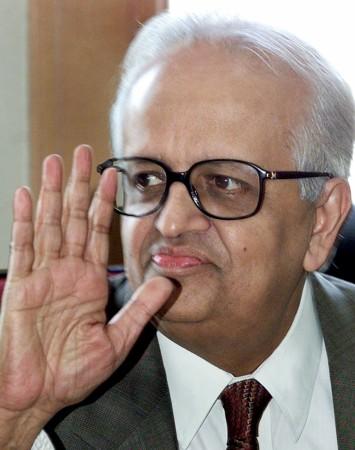
A Reserve Bank of India panel that former governor Bimal Jalan heads has the onerous task of divining the future on its hands.
The job of reforming the economic capital framework, a sticking point between the RBI and the Finance Ministry of Arun Jaitley, was never going to be easy considering the uncertain global factors.
However, the prospect of a full-blown US-China trade war and uncertainties on the oil front further complicate the situation, experts say. In a multipolar world without the givens of the bipolar world, the situation gets even more complex.
The incremental US withdrawal from world affairs under the Donald Trump doctrine of US exceptionalism coupled with China's economic expansionism makes matters worse for placing a tab on the likely currency volatility the RBI will have to handle.
Jaitley has been vocal in his demand for drawing up a policy on the size of the reserves so as to remove the uncertainty regarding the annual dividend that the RBI can possibly spare.
The RBI maintains an economic capital reserve of about Rs9.5 lakh crore or 27 per cent of its annual turnover. The North Block has sought the reduction of this capital by half to about 14 per cent.
This would mean more dividend payment from the RBI that would help improve market liquidity, according to observers. The Narendra Modi government is entering the election year amid diminishing growth, growing unemployment and general liquidity problems with lenders who stare at ballooning non-performing assets.
Prime Minister Modi has announced a massive programme to fund growth in the MSME (micro, small and medium enterprises) sector, which is a major employment growth engine. This would need the lenders to loosen their purse strings which cannot happen without the central bank pumping in more liquidity into the system.
Urjit Patel's replacement by Shaktikanta Das, a former bureaucrat who was an economic affairs secretary in the Finance Ministry, has accorded the government the opportunity to overhaul the RBI's functioning. For this, the RBI has turned to Jalal, its own former boss.
Rakesh Mohan, a former deputy governor, will be vice-chairman of the six-member committee. The panel comprises of RBI central board directors Bharat Doshi and Sudhir Mankad, economic affairs secretary Subhash Chandra Garg and RBI deputy governor NS Vishwanathan.
The RBI board decided in the November 19 board meeting that an expert committee will apply the global standards to decide if the central bank's reserves were adequate, and the quantum of money that could be spared for transfer to the government.
The government's view has been that most central banks have an economic capital of 13-14 per cent of assets as reserves, but the RBI keeps 27 per cent. By the government calculation, the RBI could spare up to Rs 4 lakh crore.
The RBI has estimated reserves amounting to Rs 9.6 lakh crore at the end of FY18, up from Rs 8.38 lakh crore in FY17. Its foreign assets are worth Rs 26.4 lakh crore (FY18), up from Rs 23.7 lakh crore in FY17.
The RBI communiqué says the committee will "review the status, need and justification of various provisions, reserves, and buffers presently provided for by the RBI" and "review global best practices followed by the central banks in making assessment and provisions for risks which central bank balance sheets are subject to."
The committee will also suggest an adequate level of risk provisioning that the RBI needs to maintain.









!['Had denied Housefull franchise as they wanted me to wear a bikini': Tia Bajpai on turning down bold scripts [Exclusive]](https://data1.ibtimes.co.in/en/full/806605/had-denied-housefull-franchise-they-wanted-me-wear-bikini-tia-bajpai-turning-down-bold.png?w=220&h=138)



